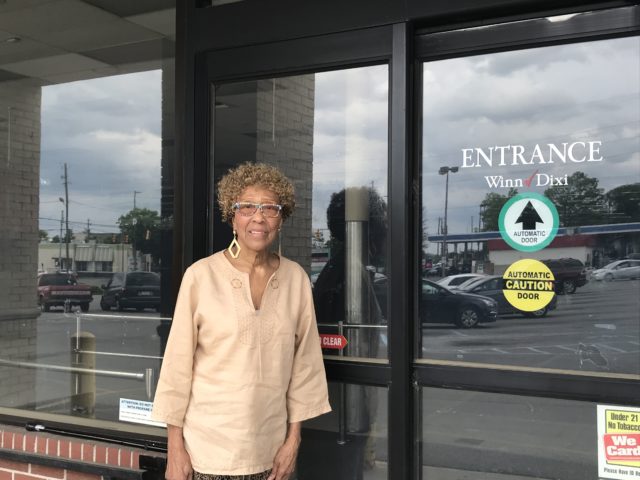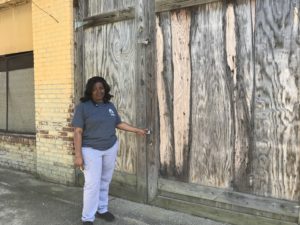
By Erica Wright
The Birmingham Times

Reshonda McNeal, president of the Killough Springs Neighborhood Association in East Birmingham, has lived in her community for more than 20 years and knows what it’s like to live in a food desert. She sometimes has to travel as far as Trussville or Clay-Chalkville, a 20-minute drive, to find a grocery store with healthy food options.
“We’ve been asking about grocery stores because we had Food Giant, but it moved to Center Point, which is not in Birmingham,” McNeal said. “We would like [stores] … with good-quality produce and good-quality foods, as well as everything else. We want good quality and a better selection, [so we’re not] limited to [one store] and settling for anything.”
“That’s one of our complaints in the whole eastern area: we don’t have a large chain, as far as a grocery store,” she added, pointing out that there is a Walmart Superstore, Neighborhood Walmart, and an Aldi but no “large chain grocery store,” like a Publix or Winn-Dixie, with more healthy options than the stores in the area.
Sixty-nine percent of Birmingham’s population lives in a food desert and each City Council district has at least one U.S. Department of Agriculture (USDA)-designated food desert, according to the city. Overall, 149,000 Birmingham residents live in a food desert.
A food desert is an area that “… [lacks] access to affordable fruits, vegetables, whole grains, low-fat milk, and other foods that make up a full and healthy diet,” according to the Centers for Disease Control and Prevention (CDC).
East Birmingham
William Harden, president of the Echo Highlands Neighborhood Association in East Birmingham, has lived in his area for the past seven years. He agreed with McNeal and added that Birmingham’s leadership should consider several other factors.

Birmingham, outside of a shuttered Food World, in his community. (Erica Wright, The Birmingham Times)
“Outside of a grocery store with healthier options, … the city [is] not taking into account the money and funds that are being spent in other municipalities,” said Harden. “It doesn’t seem like we’re spending a lot of money in our area because we’re going to places like Trussville, Fultondale, or Gardendale to get some of the additional things we need.”
Outside of an [Aldi] on Roebuck Parkway and the Neighborhood Walmart on Center Point Parkway, which offer some healthy food options, Harden has to travel to Clay or sometimes Fultondale, about a 20-minute drive, for stores with healthy choices. He pointed out that stores offering healthier options are being built in other areas, including Publix supermarkets on Lakeshore Drive, which will serve mostly Hoover residents, and downtown Birmingham.
“If you give us something we’re interested in having, we’d be able to support that, and … that money [would stay] in Birmingham, as opposed to being spread out over other municipalities,” Harden said.
Wiley Short, president of the Spring Lake Neighborhood Association in East Birmingham, said the lack of healthy food options concerns him because many of the residents in his neighborhood are elderly and can’t get around.
“We have to go to Center Point, Trussville, or Fultondale—someplace that’s a distance away, [20 minutes], to get [affordable and nutritious food], unless we go to a farmer’s market or something like that,” he said.
All three neighborhood association presidents said the city of Birmingham should do more to bring healthier food options to the eastern side of town.
“We do have elderly who are unable to get to these locations because of a lack of transportation,” said Short.
Harden has been working with the city to address the matter: “It’s a slow process, [but] when I tell my residents we’re working toward [a solution and stores] pop up somewhere else, it’s kind of hard for them to believe,” he said. “It’s not that we don’t want to work [with the city], we would just like to see some action.”
West Birmingham
Neighborhood presidents on the west side of Birmingham also have some of the same concerns.

Michelle Perkins, president of the North Pratt Neighborhood Association in Pratt City, has lived in the community for more than 30 years, and she said Forestdale is one of the closest places for healthy food.
“A lot of our older residents can’t really get to the store because a lot of them don’t drive and are in assisted-living homes,” she said. “I think we need [a healthy food grocer] in our area, so [residents] could walk to it.”
Perkins said a 24-foot trailer, designed to be a one-aisle grocery store, that sells lean meats, fruits, vegetables comes to the neighborhood every second and fourth Wednesday, offering healthier food options. Also, some neighbors offer rides to those unable to drive to the grocery store.
“The bus doesn’t run to Forestdale, so a lot of the times they have to find someone to take them to the store or go pick it up for them,” Perkins said.
Hattie Williams, Rising West Princeton Neighborhood Association President, said it’s important for the city to replace the Winn-Dixie that closed last year in Five Points West, forcing many residents to travel to Homewood or downtown Birmingham for nutritious food options.
“We all need healthy food [as we get older], and [a grocery store] would be convenient for all the elderly people that live in this neighborhood,” she said.
Many of Williams’s neighbors are elderly and can’t get around, so she urges the city to provide another option in their community.
Jimmie Coleman, president of the North Birmingham Neighborhood Association, could not agree more. His area includes the Collegeville, Hammond Park, Fairmont, Hooper City, North Birmingham, and Acipco-Finley communities, and the only supermarket is a Piggly Wiggly, so those residents often travel to Fultondale for additional healthy food options.
“The city should try to get someone to move out here, like a Calhoun’s, Publix, or Winn-Dixie, or any other major grocery store,” he said. “This is not just a want, it’s a need. Everyone deserves to have better, healthier options.”
Click one of the links below to read more stories about food deserts and grocery stores.
What City Has in Store for Nearly 150,000 Residents Living in Food Deserts
Marino’s Expands in Western Birmingham, Offers Healthier Fare




